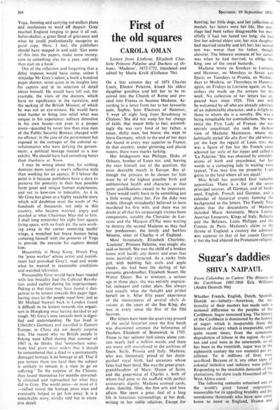First of the old squares
CAROLA OMAN
Letters from Liselotte, Elizabeth Char- lotte Princess Palatine and Duchess of Or- leans, 'Madame', 1652-1722, translated -and edited by Maria Kroll (Gollancz 7'0s).
On a late autumn day of 1671 Charles Louis, Elector Palatine, kissed his eldest daughter goodbye and left her to be re- ceived into the Church of Rome and pro- ceed into France to become Madame. Ac- cording to a letter from her to her favourite aunt, Sophie, later Electress of Hanover, `I wept all night long from Strasbourg to Chalons.' She did not weep for her change of faith; that meant little to her, astonish- ingly she was very fond of her father, a mean, shifty man, but brave; she wept to leave Germany, which to the end of her days she found in every way superior to France. In that country, under glittering and placid waters, there were sharks lurking.
Her bridegroom was Philippe, Duke of Orleans, brother of Louis xtv, and, leaving the man himself out of the question, the most desirable match in Europe. But al- though the princess to be chosen for him must be of the highest possible birth and unblemished health and character, at that point qualifications ceased to be important. There would really have to be something just a little wrong about her. For the duke was widely (though mistakenly) believed to have murdered his first wife, and there was no doubt at all that his surpassingly vicious boon companions, notably the Chevalier de Lor- raine and the Marquis d'Effat were waiting to destroy the second Madame as they had her predecessor, the lovely and luckless Minette, sister of Charles ti of England.
Most fortunately, Elizabeth Charlotte, `Liselotte', Princess Palatine, was tough; she said so herself. She was the child of a broken home with hardly any dowry and even that most painfully extracted. As a cocky little girl, with bobbing fair curls and apple cheeks, she had been the darling of her romantic grandmother, Elizabeth Stuart, the Winter Queen. But at nineteen, a serious age in those days, she was entirely ungrace- ful, inelegant and rather plain. She always said exactly what she thought and prided
herself on it. After fifty years' experience of the masterpieces of several chefs de cuisine at the court of the Sun King, she was in every sense the first of the Old Squares.
Her letters have been the quarrying ground of the social historian since the first batch was discovered amongst the belongings of Duchess Elizabeth of Brunswick in 1767. Those to her spinster half-sisters alone con- tain nearly half a million words, and there are many still unexplored in the archives of Spain, Sicily, Prussia and Italy. Madame, who was immensely proud of her distin- guished royal birth, had ancestors whose fates had been lurid. She was the great-great- granddaughter of Mary, Queen of Scots, and the great-niece of Charles 1, both of whom had gone to the scaffold with perfect aristocratic dignity. Madame scorned cards, dress, dancing, fetes, the fine arts and love affairs. She spent a great deal of a long life in luxurious surroundings, at her desk, writing to her noble relatives. Except for
hunting, her little dogs, and her collection of medals. her letters were her life. Her mar- riage had been rather disagreeable but mer- cifully it had not lasted too long; she had lost her adored eldest son; her nice daughter had married suitably and left her; her second son was worse than his father, though cleverer. The bitterest moment of her career was when he had married, to oblige the king, one of the royal bastards.
Madame wrote on Sundays to Lorraine and Hanover, on Mondays to Savoy and Spain, on Tuesdays to Prussia, on Wednes- days to Modena, on Thursdays to Hanover again, on Fridays to Lorraine again; on Sat- urdays she made up the arrears for the week. No collection of her letters has ap- peared here since 1924. This one will be welcomed by all who are already admirers of an indomitable character, and a delight to those to whom she is a novelty. She was a being remarkable for contradictions, She was twice the First Lady of France; she was entirely unpolitical; she took the darkest view of Madame Maintenon, whom she habitually styled 'die alte Zote' the old whore, yet she kept the regard of Louis my; she was a figure of fun but the French court adopted her style of fur tippet and called it `La Palatine.' She was obsessed by consider- ations of birth and precedence; her last words to a curtseying lady in waiting were typical, 'You may kiss me properly; I am going to the land where all are equal.'
Miss Kroll has provided four valuable appendices. There is a list of the seven principal sources. all German, and of books used, English, French and German, and a calendar of historical events forming the background to the letters. The Family Tree shows that the descendants of Madame included Marie Antoinette, Marie Louise. Austrian Emperors, Kings of Italy, Bulgaria and the Belgians, Louis Philippe and the Comtes de Paris. Madame's claim to the throne of England, a country she admired. was superior to that of her cousin George t; but she had abjured the Protestant religion.


































 Previous page
Previous page